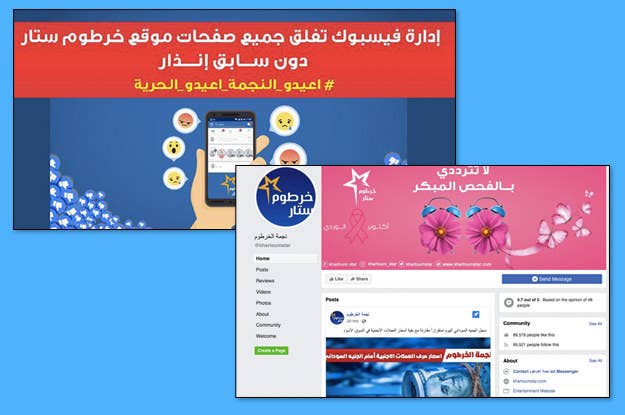
Last week, Facebook announced it had removed networks of pages, accounts, and groups linked to Russia that were targeting countries in Central Africa.
The company said the operation had engaged in “coordinated inauthentic activity,” and attributed it to Yevgeny Prigozhin, the Vladimir Putin ally indicted by the United States for his alleged role in funding the troll farm behind interference in the 2016 election.
But while the company publicly labeled 35 Facebook accounts, 53 pages, seven groups, and five Instagram accounts as part of an information operation funded by a prominent Russian, it apparently told a different story to at least one person whose page it removed.
BuzzFeed News spoke to one person in Sudan who helps run the Khartoum Star, a website that also operated the second-largest Sudanese page removed by Facebook. The man, who asked his name not be used due to privacy and safety concerns, said the company initially told him the issue with the Star’s page was related to privacy, and that it “could be fixed” within a week of its removal. Facebook did not cite inauthentic activity, he said — although he did not provide evidence of communication with the company.
“We were surprised yesterday with the closure of the page. We tried to find out what happened from Facebook,” he said in Arabic in a WhatsApp message sent Thursday. “Their answer was: a privacy violation. We were not convinced by this answer.”
His experience suggests the public information released by Facebook about its takedowns is different from what it tells those being targeted and named. A Facebook spokesperson told BuzzFeed News it could not share information beyond its announcement last week.
Joan Donovan, the director of the Technology and Social Change Research Project at Harvard’s Shorenstein Center, said Facebook’s lack of disclosure could be dangerous to administrators running pages that are taken down. When the Internet Research Agency targeted the 2016 election, it tried to encourage US citizens to be engaged in protests and share posts, but they were unaware that the activity was Russian-backed. It’s possible those same tactics are being used in other countries.
“While they have an inkling that the page is tied to Russia, Facebook doesn't know what country that person is in at the time, what their citizenship is, or their involvement with the operation," Donovan said. “I think like journalists, Facebook should be responsible in informing account holders that they will be named in an international coordinated campaign that threatens democracy in different nations. That's a serious allegation.”
Facebook should warn account holders that they’re not part of a routine takedown for their own safety, Donovan said.
The Khartoum Star page manager said he had no idea his page and website were publicly labeled as part of a Russian information operation by Facebook until BuzzFeed News sent him a link to the announcement.
“Whaaaat theeee fuck,” he replied after reading it, and quickly apologized for swearing. “Pardon my language. What you say is a big thing.”
He said the site is run by him and a group of friends and he had no clue about any alleged Russian involvement.
“We are a group of youths, we’ve known each other for a long time, we started this project,” said the page manager, who has written more than 1,500 posts for the Khartoum Star since it launched in October 2018.
“They call that a relationship that is not a relationship,” he said. “God knows where they got the idea from.”
The public information released by Facebook about the Khartoum Star’s page said that it had 11 administrators in Sudan and two in Russia.
The Khartoum Star page manager soon said he was unsettled and broke off contact with BuzzFeed News, adding “what you’re telling me is disturbing” before signing off.
Facebook did not provide BuzzFeed News with additional details on how it connected the page to the larger operation, or who the Russian administrators were.
“This page was part of the network we removed for engaging in [coordinated inauthentic behavior],” a Facebook spokesperson said.
According to Facebook’s announcement, “The people behind [Sudanese] activity used a combination of authentic accounts of Sudanese nationals, fake and compromised accounts.” The accounts taken down were also described as posting RT and Sputnik content. Both of the Russia-tied outlets have been active in the region, according to reporting by Coda Story.
As part of the takedowns, Facebook shared information with Stanford’s Internet Observatory, run by Alex Stamos, the former Facebook chief security officer, which then analyzed accounts provided by the company, as well as accounts it found independently. The Khartoum Star was first identified by Facebook and not by the researchers, according to a source with knowledge of the investigation.
The Stanford researchers analyzed content published by the Khartoum Star as well as from a handful of other Sudanese pages and found that it was neither false nor explicitly biased. While a distinct pro-Russia bend came though in some articles, “in general, the bias on these sites was subtle, and often they read like news sites that simply were not adversarial with the government,” the white paper said.
As of now, the Khartoum Star’s website still features a post demanding the return of its Facebook page. It says the disappearance of the page is “a mystery ... especially given that the page has become one of the most significant social pages in Sudan.”

